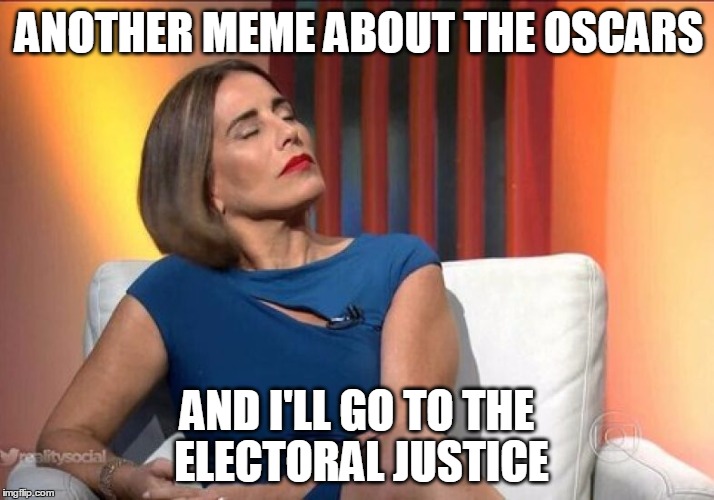
Elections: time to protect the honor?
The election period is one of the most important political moments of democracies. It is a favorable time space for debate not only among candidates, but also between citizens. It is no news that over the last elections, the Internet has taken a main role as a source for news and facts about candidates, and as a means for the spreading of ideas and positions.
On the other side, humor has been used as a powerful tool for social and political criticism way before the Internet. If before, this dissemination was done by professional cartoonists and chroniclers who had the access to communication means, now potentially anyone can become a producer of critical content, and the profiles are very diverse. Popular examples, like Dilma Bolada and the Eleições da Zueira page illustrate how these expression forms are standing side by side with models connected to the traditional media and its editorial standards.
With the beginning of another electoral period, it is natural — and healthy — that more verbalizations begin to rise. It is the case of the Facebook page “João Escória Jr.”, created as a satyre of the candidate for São Paulo’s City Hall, João Dória Júnior (PSDB/SP). Claiming offenses to his honor and image, the candidate solicited for the Electoral Justice to determine the removal of the online page, as well as the release of data that would allow the identification of its responsibles. In an injunction character, that is, without considering manifestations from Facebook or the owner of the page, the Electoral Justice accepted the request.
Once removed, a new page called “João Dóllar” with similar content was created. The candidate then went back to Justice and, again, it decided for the deletion of the Facebook page. Highlighting that the freedom of speech is not an absolute right, in both occasions the Electoral Justice understood that the existence of the pages was offensive towards the candidate.
In fact, at the same time that the Federal Constitution assures the free manifestation of thought, it also protects the right to honor and image, securing as well the right to restitution in the cases of violation. However, this pondering should be rigorous, above all in cases involving candidates to political positions, under penalty of turning the freedom of expression of citizens too frail. After all, how free can be considered the expression of an elector who need to “measure their words” to criticize candidates in the middle of the election period?
It’s also worth noting the order for the release of data that allow the identification of the users responsible for the pages. Both decisions seem to interpret the seal of anonymity determined by the Constitution as a generic authorization to identify anyone online. As we have commented before, to defend the existence of a “right to know who” on the Internet has serious consequences for the freedom of speech. For this reason, the Marco Civil da Internet (Brazil’s Internet Bill of Rights), that elects freedom of speech as one of the principles for the Internet use in Brazil, foresees that requests like this should present “founded evidences of illicit occurrence”. Did that really happen in this case?

It is a very serious topic. On August 9th, during the Abril-Google Forum for Freedom of Speech in Brasília, with the presence of ministers Gilmar Mendes (Federal Supreme Court) and Henrique Neves (Superior Electoral Court), InternetLab released preliminary results of a research that analysed judicial decisions of justice courts from all brazilian states about actions of civil nature involving humoristic content on the Internet. Although the Electoral Justice was excluded from this analysis, a third of those actions plaintiffs are from the political class. In almost all cases, the request is for moral damage restitution. In 50% of cases involving politicians, the indemnity is granted, in an average of R$16.358,32, a value above the average of restitutions involving “common citizens” of R$13.800,00.
Data like this suggests that, in Brazil, one still needs to “think twice” before criticizing a member of the political class — or even candidates for it. In an interview about the case, João Doria Júnior’s attorney affirmed that “all profiles created in disfavor of the campaign will be taken down”. It’s the symmetrical opposite of the idea that the election period should be guided by freedom of speech. To make satires, parodies and jokes is not a privilege of the brazilian way of messing around. Anyone who has followed the campaigns of Donald Trump and Hillary Clinton knows that they are far from being immune to this kind of content.
During the short period that precedes the municipal elections, to determine the removal of contents, above all in preliminary basis, can deprive the elector from having access to information and positionings that could be fundamental for their decision making. These information can be found not only in government programs, but in satires and comedic content as well, that can have important reflexions or explicit contradictions of the opponents. To give a greater weight to the honor and image of the candidates than to the freedom of speech and access to information seems to be a contradiction. As the Justice Court of the State of São Paulo has already ruled, “the politician, in general, should have a thicker skin than the ordinary man”. Especially during the elections.
Click here to access the decisions in full [PDF in Portuguese].
By Dennys Antonialli, Francisco Brito Cruz and Mariana Giorgetti Valente
Translated by Ana Luiza Araujo